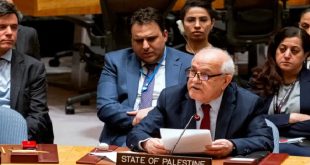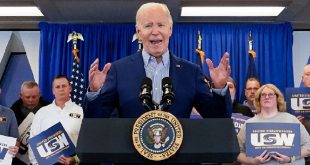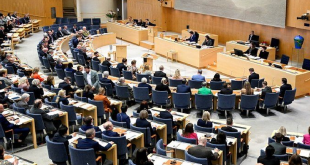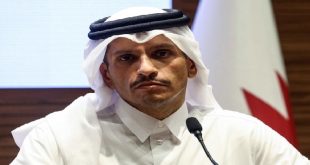Houthis vow to halt attack on Saudi installations
By SJA Jafri + Agencies
 TEHRAN/ WASHINGTON/ RIYADH/ DUBAI: Major General Yahya Rahim Safavi, a top military aide to the Leader of the Islamic Revolution, warned that if the US thinks of any plots against Iran, the Islamic Republic will respond from an area extending from the Mediterranean to the Indian Ocean.
TEHRAN/ WASHINGTON/ RIYADH/ DUBAI: Major General Yahya Rahim Safavi, a top military aide to the Leader of the Islamic Revolution, warned that if the US thinks of any plots against Iran, the Islamic Republic will respond from an area extending from the Mediterranean to the Indian Ocean.
“With the grace of God and thanks to the vigilance and patience of the great Iranian nation and the unforgettable sacrifices of 200,000 martyrs…, the Iranian nation has become an invincible regional power in West Asia,” Major General Rahim Safavi said, addressing a gathering of worshippers in Tehran on Friday.
“If the Americans think of any conspiracy, we will respond from the Mediterranean to the Red Sea to the Indian Ocean,” he added.
“Any anti-Iranian move will overturn the region,” the top official warned, adding that the Americans know well that Iran is enjoying a brave leader and powerful armed forces.
 “Our policy is to create lasting peace and security in the region and (seek) the withdrawal of foreign forces, and we hope that our trans-regional enemies would know that Iran does not intend to invade (other countries) or expand its territory,” he went on to say.
“Our policy is to create lasting peace and security in the region and (seek) the withdrawal of foreign forces, and we hope that our trans-regional enemies would know that Iran does not intend to invade (other countries) or expand its territory,” he went on to say.
The remarks came against the backdrop of increased tensions between Iran and the US after the Islamic Republic shot down an advanced US spy drone over its territorial waters and also recent attacks by Yemeni forces on Saudi oil facilities, with Washington and Riyadh claiming Iran was behind them.
The Islamic Revolution Guards Corps (IRGC) said on June 20 that a US spy drone that violated the Iranian territorial airspace in the early hours of the day was shot down by the IRGC Aerospace Force’s air defense unit near the Kooh-e-Mobarak region in the southern province of Hormozgan.
The intruding drone was reportedly shot by Iran’s homegrown air defense missile system “Khordad-3rd”.
 Tensions between the US and Iran escalated further after Yemeni armed forces conducted a large-scale operation against Saudi Arabia’s Aramco oil installations on Saturday, in response to the Saudi-led war on their country.
Tensions between the US and Iran escalated further after Yemeni armed forces conducted a large-scale operation against Saudi Arabia’s Aramco oil installations on Saturday, in response to the Saudi-led war on their country.
The Yemeni Houthi Ansarullah movement immediately took credit for the attacks, but US Secretary of State Mike Pompeo swiftly accused Iran of being behind the assault, without providing any evidence. Tehran categorically rejected the allegations.
Meanwhile, Saudi Arabia claimed on Wednesday that the strikes on its oil infrastructure came from the “north” and were “unquestionably” sponsored by Iran, adding that the Houthis were not responsible for the assault despite claiming it.
Shortly after the Saudi announcement, the spokesman for Yemeni Armed Forces, however, reiterated it was behind the weekend attack, stressing that the Houthis have new drones, powered by “normal and jet engines” that can reach targets deep in Saudi Arabia.
 “Our forces have reached a high level of efficiency and ability. They can manufacture various types of unmanned aerial vehicles in record time. The Second Deterrent Balance Operation, which targeted Saudi oil installations, is a perfect example of the capabilities of our forces in terms of planning and implementation,” Brigadier General Yahya Saree said during a press conference in the capital Sana’a.
“Our forces have reached a high level of efficiency and ability. They can manufacture various types of unmanned aerial vehicles in record time. The Second Deterrent Balance Operation, which targeted Saudi oil installations, is a perfect example of the capabilities of our forces in terms of planning and implementation,” Brigadier General Yahya Saree said during a press conference in the capital Sana’a.
Earlier, President Donald Trump says the United States (US) has imposed new sanctions on Iran’s central bank following Tehran’s alleged involvement in last weekend’s drone and cruise missile attacks on Saudi oil facilities.
Speaking in the Oval Office during a meeting with Australian Prime Minister Scott Morrison, the US leader said: “We have just sanctioned the Iranian national bank.”
Trump said he expected the penalties to “work” on Iran and preferred that strategy to military action.
He said: “I think the sanctions work. The military would work. That’s a very severe form of winning.”
 US Treasury Secretary Steven Mnuchin told reporters the bank was Tehran’s last source of funds, saying: “We have now cut off all funds to Iran”.
US Treasury Secretary Steven Mnuchin told reporters the bank was Tehran’s last source of funds, saying: “We have now cut off all funds to Iran”.
The president signaled he was not inclined to authorize a military strike on Iran in response to the country’s suspected role in Saturday’s attacks on the Khurais oil field and Abqaiq oil processing facility – which his secretary of state, Mike Pompeo, described as an “act of war”.
Trump said he believed showing restraint “shows far more strength” and he wanted to avoid an all-out war.
He said: “Well these are the strongest sanctions ever put on a country. We are at a level of sanction that is far greater than ever before with respect to Iran. Today we did central bank, as you know and we’ll see, we’ll see.
“They’re having a lot of problems, not only with us, they’re having problems within their own country and I think they have a lot of self-made problems.”
 Iran has denied any involvement in the 14 September attacks on the Saudi Aramco facilities, which shook global oil markets and further heightened tensions between Washington and Tehran.
Iran has denied any involvement in the 14 September attacks on the Saudi Aramco facilities, which shook global oil markets and further heightened tensions between Washington and Tehran.
It warned that any retaliatory strike on it by the US or the kingdom would lead to “an all-out war”.
The US and Saudi Arabia have accused Iran of launching the attacks, which Yemen Houthi rebels earlier claimed as a response to the Saudi-led war there which has killed tens and thousands of people.
Saudi Arabia claims Iranian cruise missiles and drones were used to attack the kingdom’s oil industry and showed journalists the remains of weapons at a news conference earlier this week.
While military spokesman Colonel Turki al-Malki did not directly accuse Iran of firing the weapons or launching them from inside Iranian territory, he told journalists: “The attack was launched from the north and was unquestionably sponsored by Iran”.
 On Friday, Lebanon’s Hezbollah warned Saudi Arabia against betting on a war against Iran because it would destroy the country.
On Friday, Lebanon’s Hezbollah warned Saudi Arabia against betting on a war against Iran because it would destroy the country.
He urged Riyadh and the United Arab Emirates to halt the war in Yemen instead of buying more air defences.
In a televised speech, Hezbollah leader Sayyed Hassan Nasrallah said: “Your house is made of glass and your economy is made of glass. Like the glass cities in the UAE”.
On the other hand the United States (US) has announced plans to send forces to Saudi Arabia in the wake of attacks against the country’s oil infrastructure.
Secretary of Defense Mark Esper told reporters the deployment would be “defensive in nature”. Total troop numbers have not yet been decided.
Yemen’s Iran-backed Houthi rebels have claimed responsibility for the attacks against two oil facilities last week but the US and Saudi Arabia have both blamed Iran itself.
 Earlier on Friday however, President Trump announced “highest level” sanctions against Iran while signaling he wanted to avoid military conflict.
Earlier on Friday however, President Trump announced “highest level” sanctions against Iran while signaling he wanted to avoid military conflict.
“I think the strong person approach, and the thing that does show strength, would be showing a little bit of restraint,” he told reporters in the Oval Office.
The fresh sanctions will focus on Iran’s central bank and its sovereign wealth fund, Trump said.
Esper made the announcement alongside the chairman of the Joint Chiefs of Staff, Gen Joseph Dunford Jr on Friday.
Saudi Arabia and the United Arab Emirates requested assistance, Esper said. The forces will focus on boosting air and missile defences, and the US will “accelerate the delivery of military equipment” to both nations.
 Gen Dunford called the deployment “moderate” and said it would not number in the thousands. He gave no further details about the type of forces to be sent.
Gen Dunford called the deployment “moderate” and said it would not number in the thousands. He gave no further details about the type of forces to be sent.
According to the New York Times, when reporters asked Esper if military strikes on Iran were still being considered, the defence secretary responded: “That’s not where we are right now.”
Strikes hit the Abqaiq oil facility and the Khurais oil field in Saudi Arabia a week ago, affecting the global oil supply.
On Wednesday, the kingdom’s defence ministry showed off what it says is the remains of drones and cruises missiles proving Iranian involvement. The country is however still “working to know exactly the launch point”, a spokesman said.
The US also alleges Iran is responsible. Senior officials have told US media outlets they had evidence the attacks originated in the south of Iran.
 Iran has repeatedly denied any role in the strikes, with President Hassan Rouhani calling the attacks a reciprocal act by the “Yemeni people”.
Iran has repeatedly denied any role in the strikes, with President Hassan Rouhani calling the attacks a reciprocal act by the “Yemeni people”.
“US is in denial if it thinks that Yemeni victims of 4.5 yrs of the worst war crimes wouldn’t do all to strike back,” Iran’s Foreign Minister Mohammad Javad Zarif tweeted.
Meanwhile, the Yemen’s Houthi rebels announced on Friday that they planned to halt all attacks on Saudi Arabia as part of a peace initiative to end their country’s devastating conflict.
Mehdi Al Mashat, head of the Huthis’ supreme political council, announced in a speech marking the 2014 rebel seizure of the capital Sanaa “the halt of all attacks against the territory of Saudi Arabia”.
He added that he hoped “the gesture would be answered by a stronger gesture” from the Saudis, according to the rebels’ Al Masirah television channel.
 The announcement comes after a wave of drone strikes last weekend on Saudi oil installations knocked out half of the kingdom’s production and sent shock waves through energy markets.
The announcement comes after a wave of drone strikes last weekend on Saudi oil installations knocked out half of the kingdom’s production and sent shock waves through energy markets.
The Houthis claimed responsibility for the attacks, but Riyadh’s ally Washington has placed the blame on Iran, which backs the Yemeni insurgents.
President Donald Trump and the US Treasury Department on Friday laid out the latest in a series of economic sanctions against the Islamic republic.
Al Mashat said the Houthi peace initiative was aimed at “bringing about peace through serious negotiations to achieve a comprehensive national reconciliation which does not exclude anyone”.
A major goal was to “preserve the blood of Yemenis and achieve a general amnesty”, he added.
 Pressmediaofindia
Pressmediaofindia



